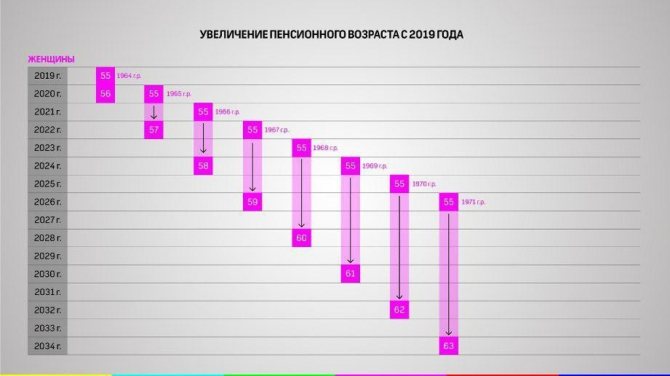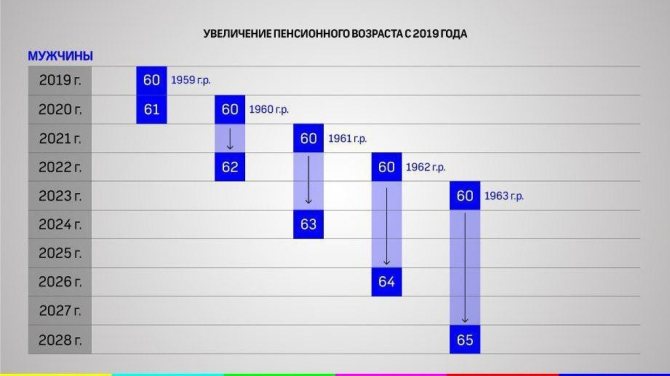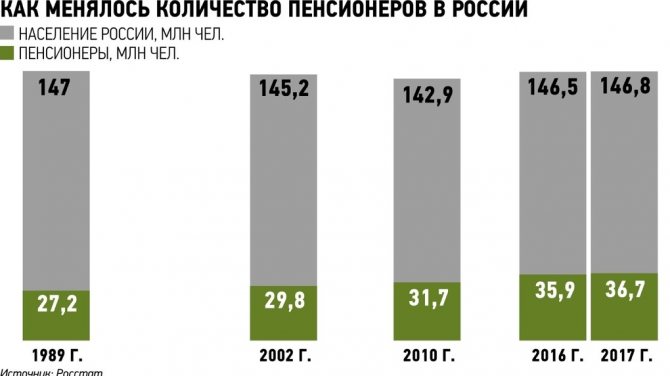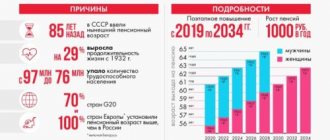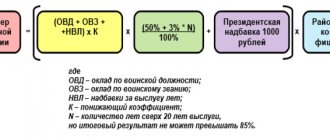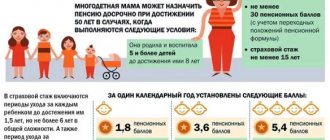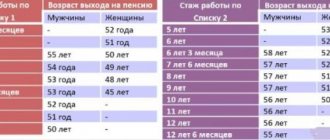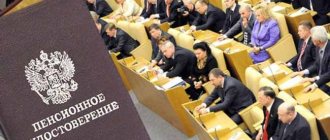The pension reform, which will come into force next year, will take place gradually.
The changes will first affect men born in 1959 and women born in 1964. They will retire in 2020 at ages 61 and 56, respectively. And so on, over the years.
As Prime Minister Dmitry Medvedev noted, such a measure will allow additional funds to be allocated to increase pensions above the inflation rate.
Please note that the new rules will not apply to those who have already retired.
In addition, thanks to the program to increase the working age, their pensions will increase by 1 thousand rubles per year. As Medvedev said, pensioners will receive the social benefits they are entitled to.
It is also worth considering that employees with extensive experience will be able to retire two years earlier than the established retirement age.
What will change
Currently, the standard retirement age in Russia is 60 and 55 years for men and women, respectively. These numbers were introduced back in 1932 and have not changed since then. Over the past few years, this issue has been actively discussed and studied at the highest level. By raising the retirement age, the authorities will be able to increase the number of employed citizens and reduce the burden on the budget. If the law is adopted, women will begin to retire 8 years later, men - 5.
Consideration of a bill to raise the retirement age
The draft law was approved by parliament at a meeting on June 14. Later, the law was considered by the commission for the coordination of social and labor relations.
First reading of the bill
The law on adjusting the age limits for applying for pensions was adopted in October 2020. The Law on Retirement Age consolidates the slow increase in the age range for women from 60 to 63 years old by 2034. For representatives of the stronger sex from 60 to 65 years old by 2028.
The bill on raising the retirement age in 2020 was approved by United Russia deputies. The communists, A Just Russia, and the Liberal Democratic Party did not support the draft imperative. In the State Duma, the law was brought up for discussion by the Minister of Employment and Social Protection M. Topilin. He believes that the reformation will allow pensions to be raised 2 times higher than inflation.
From 2020, legislators promise to raise pensions by 1,000 rubles annually. In 2024, the pension will increase and amount to 20,000 rubles.
Deputies introduced benefits for receiving pensions before the due date. Retirement two years early is granted to women with 40 years of service and men with 45 years of service and above. Women with more than five children, disabled people, and liquidators of the Chernobyl nuclear power plant release receive pensions earlier than generally accepted norms. Workers in hazardous industries and hazardous industries are eligible for preferential rates.
Members of Yabloko rallied at the State Duma demanding that the implementation of the law be repealed. Communists and members of A Just Russia tried to disrupt the vote for approval of the bill. Deputies of the LDPR and A Just Russia demanded that the consideration of the law be canceled and called it contrary to human rights enshrined in the Constitution.
Yaroslav Nilov, a member of the Labor and Social Protection Committee, criticized the imperative. G. Zyuganov called the law a gross violation of the rights of citizens. The communist leader noted that Western pensioners have incomes that exceed pensions in Russia, and our legislators are promising an increase of 1,000 rubles, which will not help older people survive on pensions. The LDPR leader criticizes the transformation of the payment mechanism. Sergei Mironov said that statistical indicators of life expectancy have increased due to a decrease in infant mortality, so the government’s main argument for reforming the pension calculation mechanism is absurd.
Mitigation proposals
The President made proposals to adjust the provisions of the law on retirement age. Putin noted that women, in addition to work, take care of the house, taking care of their family and children, so it is impossible to increase the retirement age as for men.
The President said that the reformation would be carried out taking into account the needs of the people. He also spoke about introducing measures to protect the rights of older citizens in the labor market. V. Putin proposed discussing pension innovations and checking forecast and estimated figures. The State Duma held hearings. Based on their results, the following proposals were made:
- the existing privileges of pensioners shall not be changed;
- pay a funded share of the pension;
- To grant early retirement, lower the standards of length of service.
After the hearing, Putin announced amendments to the law:
- Instead of 63 years of age, women will be allowed to retire at 60 years of age.
- Mothers with many children will be allowed to apply for early retirement according to current standards. Mothers of three children will be sent 3 years earlier than the updated dates, mothers of four - 4 years earlier. For mothers of five children, the innovations will pass; they will go on vacation at 55 years old.
- Persons who planned to retire in 2019–2020 will go on vacation according to the new rules, but six months earlier.
- Benefits will not change for:
- workers in high-temperature workshops;
- liquidators of the nuclear power plant release in Chernobyl;
- miners;
- workers in the chemical industry;
- workers of the Far North.
Since 2020, rural non-working pensioners with 30 years of work experience in rural areas are entitled to a 25% supplement to their pension.
- For citizens who started working early, legislators granted early retirement. It is proposed to reduce the length of service for calculating a pension before the deadline for women to 37 years, for men to 42 years.
- Pre-retirement workers are being strengthened to protect their rights from arbitrariness by employers. If an elderly worker is fired for no reason, the employer faces a fine of 200,000 rubles. Penalties are imposed for refusal to hire citizens of advanced years.
- Privileges will not be revoked:
- the right to free travel on public transport;
- benefits for housing and communal services, payment for medicines.
Second reading of the imperative
On September 26, 2020, in the second reading, the State Duma adopted a law changing the retirement age with adjustments from the president. The law was supported by 326 State Duma members, 59 were against it, and one abstained. The discussion lasted 3.5 hours. The legislators who proposed adjustments proved the importance and feasibility of their proposals to soften the reform. 72 adjustments proposed by members of parliament were not supported by officials.
Duma members approved nine of Putin's adjustments unanimously. The president softened the age limit for women to 60 years old, secured early retirement for mothers with many children, and established an increase in pensions for rural workers. 385 people voted for Putin's adjustments.
In the first reading, the Duma members supported the concept of the imperative and the main theses; in the second reading, they adopted amendments to the law. During the discussion, members of the parties “Communist Party of the Russian Federation”, “LDPR” and “A Just Russia” defended proposals for adjustments. Lawmakers made proposals to protect the rights of workers in the Far North, Far East, Siberia, teachers, doctors and rural workers.
According to Rosstat, representatives of the stronger sex in Siberia live 64 years, in the Far East - 63 years, therefore, they will not live to see retirement. It is dangerous for them to change the age limits for receiving pensions, because this will entail an outflow of people from the territory of the Siberian and Far Eastern districts.
Vladimir Sysoev, State Duma deputy:
Respect the work of people who work in gas and oil production, gold and diamond mines, live without amenities, and help develop the country’s economy. Do not leave them without early provision of a pension.
Members of the LDPR party demand that early retirement be established for doctors and teachers, and that the period of study in higher educational institutions be counted as length of service. The initiative to include studies in the length of service was not supported, as the burden on the pension fund would increase.
A million signatures against the innovations were received by the presidential administration. There were proposals from legislators to postpone the reformation by 20 years.
Sergei Ivanov, State Duma deputy:
There is no reliable evidence that reformation is inevitable. Of the 32 million population capable of working, a third plans to leave the country, another third lives one day at a time without accumulating savings, and a third works illegally. Consequently, there will be no one to pay for those who are forced to work five years more!
The politician believes that reformation can be avoided.
Oleg Shein considers the law criminal and violating the rights of citizens.
Oleg Shein:
The bill does not take into account the situation on the labor market. There is no information about how much unemployment and crime will increase, or how much the standard of living will fall. The idea of reform is absurd. Passing a law is criminal.
Deputy Maxim Oreshkin proposed using the reserve fund to support pensioners, rather than investing the fund's funds in the capital of Western countries. Minister of Labor M. Topilin defended the law as follows: “The reform will allow raising pensions, outpacing inflationary processes. Rosstat provided data that unemployment is decreasing and the labor market is ready to accept additional labor.” The Minister of Labor noted that all countries have raised the age level for calculating pensions and Russia will follow the beaten path.
Who will be affected first by the reform?
The innovation will be the first to affect men born in 1959 and women born in 1964, reports the portal Therussiantimes.com. They will retire in 2020. At the same time, the retirement age for them will increase by one year.
|
| This will increase the retirement age for women |
And so - for men:
|
Why is pension reform necessary in Russia?
According to the authors of the bill, the need for pension reform is caused by the following reasons.
- In our country, there is a constant increase in pension recipients, while the number of people for whom pension contributions are paid, on the contrary, is decreasing.
- The current retirement age of 60 years for men and 55 years for women was fixed in the 30s of the last century. When establishing such a retirement age, they focused primarily on workers employed in industry. After all, at that time industrialization was underway throughout the country. However, the average life expectancy was only 43 years. Currently, average life expectancy has increased, and the share of blue-collar jobs is decreasing.
- 30% of pensioners continue their working activities. Moreover, the number of workers in the first years of retirement is significantly higher than 30%. The number of working pensioners decreases significantly after reaching the age of 35.
- International standards (ILO Convention No. 102 on Minimum Standards of Social Security) allow the retirement age to be set at 65 years and above.
Why raise the retirement age at all?
According to an analytical report prepared by RANEPA experts, if the retirement age is not raised, Russia will face a record reduction in the working-age population - 4 million people from 2020 to 2030. By 2036, one working Russian will be financially responsible for himself, his family and an additional one pensioner, and in the future - for more than one. According to the Ministry of Economic Development, the number of working-age population will be reduced to 80.6 million people by 2020.
|
| The number of pensioners in Russia continues to grow. This is one of the main arguments in favor of raising the retirement age. |
The main argument given by the government is the increase in life expectancy of Russians. It was voiced by Dmitry Medvedev at a government meeting.
Dmitry Medvedev, Prime Minister:
“Nowadays people not only live longer, they remain active longer. A person of retirement age 30 years ago and today are different people. Many people at this age are full of strength and desire to work. The number of working pensioners on average per year is 12 million people.
Putin signed the law on the “all-Russian digital concentration camp,” as opponents call it
Previously, the law “On the Unified Federal Information Register containing information about the population of the Russian Federation” was adopted by the State Duma and approved by the Federation Council. Now comes into effect.
It is about creating a database of Russians, which will contain information about citizens of the country and foreigners located in Russia. The data will be collected from the information systems of government agencies and state extra-budgetary funds.
The state will collect about 30 types of various information about citizens, including level of education, marital status, etc.
The register will not include data on the income and property of citizens, as well as information that constitutes a state secret. The Federal Tax Service (FTS) was appointed operator of the register.
The State Duma even released a special video explaining the safety of this law.
Video of the State Duma of Russia: “The whole truth about the unified database of Russians”
But this law caused a lot of controversy in society. Moreover, between seemingly people who hold the same views and are loyal to the current Russian authorities.
It was precisely because of this law that TV presenters Anna Shafran and Vladimir Solovyov recently had a fight and separated. And the leader of the Communist Party of the Russian Federation Gennady Zyuganov believes that now “the Anglo-Saxons will control each of us... This is an electronic household concentration camp that the Nazis never even dreamed of.”
Even famous cultural figures spoke out against the law. Svetlana Kryuchkova, Alexander Rosenbaum, Natalya Bondarchuk, Alexander Mikhailov, Ivan Okhlobystin, Nikolai Burlyaev and Maria Shukshina recorded a video message where they spoke out against “digital control of Russians.” But the authorities did not take their opinion into account.
Video: artists’ appeal against the law on the federal information register
Opponents of creating a unified database of people in Russia are primarily afraid of information leakage. Many people know how bad everything is in Russia with the storage and protection of personal data. But this is not the only complaint.
What people don’t like about the new law, they themselves write on social networks.
Putin approved the creation of a unified register of Russians: https://t.co/lE73h4zDuD
— Bereznitsky Vyacheslav (@Viacheslav43) June 8, 2020
You can see from his face: he’s disingenuous.
— Galiaveev (@sirasetdin) June 8, 2020
Putin signed a law on the creation of a unified register of information about the population Counting serfs in Rus' is a long-standing pastime of members of the United Russia party...
— Curls of Putin (@vasa75685) June 8, 2020
Putin approved the creation of a unified register of Russians: https://t.co/QJamwX8bLg pic.twitter.com/x9xN0qEyMg
— Mishin Vladimir (@Kemer7770) June 8, 2020
Putin signed a law creating a single register containing all information about citizens. It will also track all important stages of life from the moment of birth. Welcome to the digital Gulag. I’m generally silent about the fact that bandits of all stripes, in addition to those from the Kremlin, will have the data.
— ЯR (@Hypecoum_) June 8, 2020
Dear Vladimir Vladimirovich! Please comment, did you today sign the law on creating a unified register of information about Russians? Is there a risk that now an unscrupulous tax officer who has access to this information may trade it?
— Mark (@Mark74557122) June 8, 2020
Most likely, the people who created and legitimized the idea of the Unified Federal Information Register (EFIR) thought that in order to fully record personal information about a citizen, there was still not enough data on his historical genetic predisposition to various types of activities...
— Valeriy (@capt_VG) June 6, 2020
On the patriotic security ship Bund?
— Mortuus (@Mortuus_1) May 20, 2020
it will allow for increased surveillance of the population; soon they will be forced to install analyzers in toilets to determine what a person ate the day before, and then report on what products were purchased...
— Vladimir Savenko (Volgogradets) (@zhitelvlg) May 22, 2020
In general, this whole figure has reached the point of schizophrenia. Total control. Digital concentration camp.
— Anton (@AntonBelosludts) May 20, 2020
The law on the creation of a unified register with information about citizens, adopted by the State Duma on Thursday, is another manifestation of digital authoritarianism. The state uses technological progress not to improve the lives of Russians, but to strengthen its own power and control the opposition.
— Nikolay Rybakov (@nikolayrybakov) May 21, 2020
A very dangerous precedent, having all the information on a person, and his background, the authorities and money bags receive unlimited possibilities. This is much worse than the “long arms” of the KGB. Financial information and personal preferences of each person under the analysis of businessmen will enrich them.
— EVicancom (@EVicancom) May 21, 2020
Now we are giggling, rolling our eyes “reptilians, conspiracy theories,” and our children will live in digital fascism.
— Brom (@bromtula_) May 22, 2020
pic.twitter.com/hRGDtQweFy
— Brom (@bromtula_) May 21, 2020
They will create a register of Russians, and the boyars will divide the slaves among themselves.
— NormaJ (@galamm11) May 21, 2020
Considering that everything is done through the anus, the database will most likely make life easier for criminals and scammers. Less time will be spent searching for victims
— neUkrop (@neUkrop) May 21, 2020
It was necessary to immediately set the recommended retail price for the base, so as not to have to get up twice
— Demenshin (@demenshin) May 21, 2020
Nikita Mikhalkov: “The Unified Population Register is a gift from the CIA and all intelligence services.”
They count the livestock.
